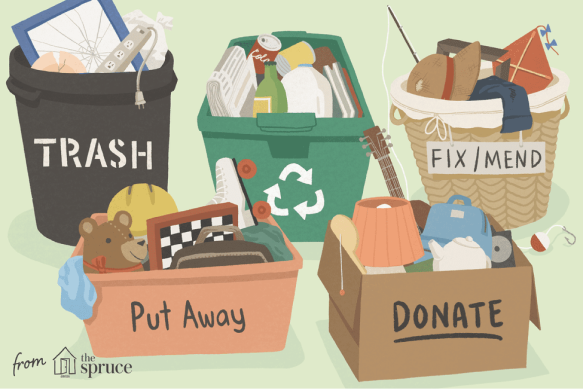Chip Conley, Author of “Wisdom @Work” said, “Accumulation is for the first half of life, editing is for the second half.” Looking at all the things I don’t need or use has been eye opening. Why on earth did I purchase so many shoes? And dresses? And jackets? Since there’s nowhere to go wearing all those items, it was time to re-think (and stare at) my stuff.
In his book “Stumbling on Happiness,” psychologist Daniel Gilbert says that satisfaction and joy from owning an object quickly wanes. It’s what psychologists call habituation and economists call it “declining marginal utility.” As you accumulate more, one’s happiness quotient declines over time. So why do some of us develop strong materialistic values and others don't? Research indicates that financial and emotional insecurity--lies at the heart of consumeristic cravings. If you care a ton about what others think of you, you might be suscestible to buying more. In addition to that, it’s not money but rather the striving for it, that's linked to unhappiness.
The decluttering process is something many of us avoid - only making it worse. That might be because it forces us to take a closer look at ourselves. According to Marie Kondo, author of “The Life-Changing Magic of Tidying Up”, she wrote, "The process of facing and selecting our possessions can be quite painful. It forces us to confront our imperfections and inadequacies and the foolish choices we made in the past."
Visually Disturbing
One study by Princeton researchers found that physical clutter in our surroundings competes for our attention, resulting in decreased productivity and increased stress.
Piles of paper stacked in a corner may not seem like a big deal but research shows cluttered areas have a cumulative effect on our brains. Our brains like order, and visual reminders of clutter drain our cognitive resources, reducing our ability to focus. The visual distraction of clutter increases cognitive overload and can reduce our working memory. I’ve often said that if something was out of place or a complete mess that it was “visually disturbing.” I didn’t realize how true that statement was and how we can control it which helps reduce our anxiety and depression.
When we store too much and hold onto things we no longer want or need, it’s another thing to think about and focus on rather than more important things like relationships.
Tips for Editing Possessions:
- Set your timer for 10-20 minutes, and begin "a speed elimination." Move through your home tossing or recycling anything that you no longer want or need.
- If #1 is too severe, give yourself a month and hit it room by room or closet by closet. After 30 days, the burden of owning too much stuff will be lifted.
- Choose quality over quantity.
- Divide your things into four boxes: donate, throw away, keep, and things to sell. If you don’t love it, get rid of it. Do NOT change your mind and pluck it from the get rid of it pile.
- Consider gifting things on a neighborhood “Free Stuff” post - you never know how you might impact another person’s life.
- Envision your end goal - what will it look like and feel like to get rid of loads of unwanted items and clutter? As a result of your self imposed “cleanse” how much more accomplished will you feel?
“A dramatic reorganization of the home causes correspondingly dramatic changes in lifestyle and perspective. It is life-transforming.”
-Marie Kondo
Our world has been overwhelmed by consumer pursuits for a long time. Home sizes are growing, but happiness and mental health are not. Too much purchasing has proven detrimental and causes more stress, anxiety, fatigue, and regret in people’s lives. Changing that dynamic can be life changing (according to Marie Kondo) which is why I’m living by this quote.
Reviewed & Recommended:
- If you’re not motivated to edit your surroundings, watch this TEDs talk by Star Hans about making peace with your stuff and yourself. I literally tore through my closets after watching this talk. Listen to the Monster in Your Closet | Star Hansen | TEDxTucson
- We Review “Minimalism: A Documentary About the Important Things” also created a podcast. This podcast is on the joys of owning less. 247 | Owning Less The Minimalists podcast
- Why Material Things and More Stuff Will Never Make You Happy
| MORE ARTICLES
Emily’s vision for illume hire developed as part of her journey from a startup-curious sales and media professional to co-founder and CEO. Her passion is to provide resources to support professionals with 20+ years experience. Emily was part of the founding leadership team of Age Equity Alliance, a non-profit focused on the benefits of an intergenerational team.


